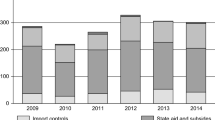Abstract
Using a simple characteristic space model of monopolistic competition with two interdependent markets, this paper analyses the effects of the bilateral adoption of antidumping measures on the degree of product differentiation, as well as the relationships with the type of product arrangement and the implications for welfare. Under an arrangement where each domestic firm competes directly with two imported products (interleaved arrangement), the model reproduces some of the results that already exist in the literature, where these have been obtained in an oligopolistic context. Through the characterisation of the symmetric zero profit equilibrium, it is shown that under such an arrangement the degree of product variety is higher when governments do not impose bilateral restrictions on prices. By contrast, under an arrangement where each half of the market is made-up of products of the same nationality (split arrangement), the reciprocal imposition of antidumping legislation has no effect on either the degree of product variety or on social welfare.
Similar content being viewed by others
Author information
Authors and Affiliations
Additional information
Received: March 2000/Accepted: May 2001
Rights and permissions
About this article
Cite this article
Andaluz, J. The effects of antidumping legislation on the degree of product variety and social welfare. Ann Reg Sci 35, 561–575 (2001). https://doi.org/10.1007/s001680100057
Published:
Issue Date:
DOI: https://doi.org/10.1007/s001680100057




